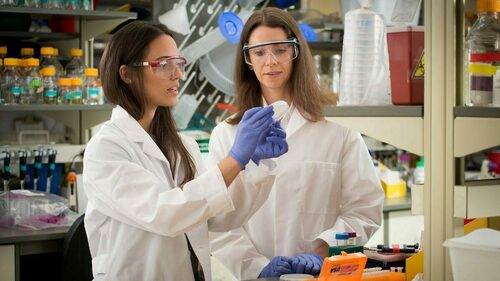
Researchers from the University of Notre Dame have received $180.6 million in research funding for fiscal year 2019 — $100 million more than 10 years ago and a more than 27 percent increase from last year. The awards received support a broad range of projects that tackle globally significant issues, including vector-borne diseases, cancer, psychology, nanotechnology, hypersonics and much more.
“The consistent, exceptional growth in research funding over the last few years is a testament to the hard work of Notre Dame’s talented researchers and their desire to have a positive impact,” said Robert J. Bernhard, vice president for research and professor in the Department of Aerospace and Mechanical Engineering. “These awards have an effect both here on campus and beyond — to our students who gain hands on experiences in archives and laboratories, to our local community which benefits from increased inward investment in the South Bend-Elkhart region, and to faculty, postdoctoral scholars and other researchers who translate their findings into real-world applications.”
Some of the notable awards, which were selected to illustrate the diverse array of research at Notre Dame, include:
- A $7.8 million grant, which is part of a $38.1 million, five-year commitment from the Semiconductor Research Corporation and Defense Advanced Research Projects Agency for the Applications and Systems-Driven Center for Energy-Efficient Integrated Nanotechnologies (ASCENT). ASCENT aims to provide breakthrough advances in semiconductor technologies and is led by Suman Datta, the Stinson Professor of Nanotechnology in the Department of Electrical Engineering within the College of Engineering. The center is supported by 29 other principal investigators at 13 partner universities.
- A $5.9 million grant award that is part of a larger $33.7 million, five-year commitment from Unitaid to determine the efficacy of a spatial repellent product in the prevention of mosquito-borne diseases like malaria. The research is led by John Grieco, research associate professor in the Department of Biological Sciences in the College of Science and associate director of the Eck Institute for Global Health.
- A $1.8 million award from Lilly Endowment Inc. to continue research examining the wellbeing of pastors and priests to be engaged in ministry. Known as Flourishing in Ministry, the project is led by Matt Bloom, associate professor in the Department of Management and Organization in the Mendoza College of Business and director of the Wellbeing at Work Program.
- A nearly $1 million grant, which is part of a $5.4 million commitment from the U.S. Agency for International Development (USAID), to assess the feasibility and conduct long-term retrospective impact evaluations of USAID-funded activities. The project is led by Danice Brown Guzmán, research associate for the Notre Dame Initiative for Global Development within the Keough School of Global Affairs.
- More than $900,000 award that is part of a $2.1 million commitment from the John Templeton Foundation for a program to incorporate science and the philosophy of science in conversation with theology in Indian and Pakistani madrasas, which are centralized institutions aimed at preparing Islamic religious leaders. The research is led by Ebrahim Moosa, professor of history and Islamic Studies in the College of Arts and Letters and the Keough School of Global Affairs.
Overall, the largest award received by the University this year was $21.5 million — part of a larger $42.4 million five-year commitment — from Lilly Endowment Inc. to Thomas G. Burish, the Charles and Jill Fischer Provost, for the formation of the Labs for Industry Futures and Transformation (LIFT) Network, which will enhance and link cutting-edge expertise, technologies, workforce development programs and innovation-based facilities throughout the surrounding community. The grant award will support the development of the broader South Bend-Elkhart region as an economic leader in next-generation manufacturing, entrepreneurship, applied analytics and technology.
Of the University’s 695 awards received in fiscal year 2019, approximately 62 percent came from federal funding, while 32 percent came from foundations and other sources, and 6 percent from industry. Overall, the University’s externally funded research had a global footprint of 28 grants in 23 different countries, totaling $36.9 million. To explore more about external research funding at Notre Dame, please visit research.nd.edu/about/facts-figures.
Contact: Brandi R. Wampler, research communications specialist, Notre Dame Research, brandiwampler@nd.edu, 574-631-8183; @UNDResearch